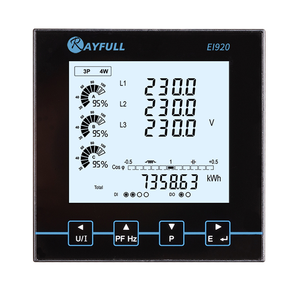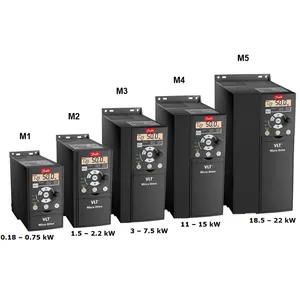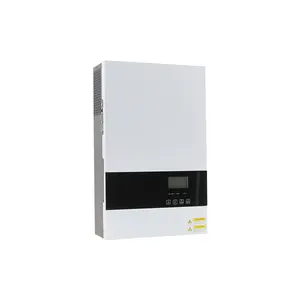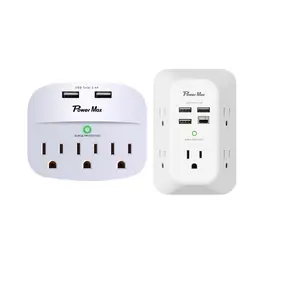Popular in your industry




















































































































































Top categories
About meter panels
Meter panels are essential components in electrical systems, serving as the interface for monitoring and managing power consumption. A meter panel can be an ampere meter, a panel meter, or a more complex digital panel meter, each designed to fulfill specific measurement needs within an electrical circuit.
Types and Features of Meter Panels
The variety of meter panels available is vast, with each type catering to different measurement requirements. The classic analog panel meter is known for its straightforward design, displaying readings with a moving needle over a calibrated scale. These are often found in educational settings or in situations where digital technology is not a necessity. In contrast, digital panel meters offer a more contemporary approach, with features such as touch-screen interfaces, customizable displays, and the ability to measure multiple parameters simultaneously. For instance, a digital meter panel might combine the functions of an ampere meter and a volt meter, providing a comprehensive overview of an electrical system's health. High-capacity models, like the 400 amp meter base with 2 200 amp disconnects, are engineered to handle substantial electrical loads, making them suitable for industrial applications where power distribution is critical.
Structure and Materials of Meter Panels
The structural integrity of a meter panel is paramount. A typical 200 amp meter socket with main breaker is designed with a compartmentalized approach, segregating the metering components from the main breaker for safety and ease of access. The metering section, often equipped with sophisticated sensors, is responsible for the accurate measurement of electrical parameters. The main breaker compartment serves as a critical safety feature, designed to interrupt power in the event of an overload or short circuit. The choice of materials for these components is equally important. For example, the enclosure of a 400amp meter main is usually made from heavy-duty, corrosion-resistant materials like stainless steel or reinforced polymers, which protect the internal components from environmental and mechanical stresses.
Materials and Durability of Meter Panels
The materials chosen for meter panels are selected based on their ability to provide durability and safety. For instance, the enclosures of high-capacity panels, such as a 400 amp meter panel, are often constructed from metals that can withstand high temperatures and resist corrosion. Inside, the use of copper and other conductive metals for wiring ensures efficient electricity transmission with minimal resistance. Insulating materials like fiberglass or thermoplastic polymers are used to prevent electrical shocks and short circuits, ensuring the meter panels can operate safely even in demanding industrial environments.
Applications and Business Usages of Meter Panels
Meter panels are ubiquitous in their application across various industries. In machinery repair shops, they are indispensable for troubleshooting electrical issues. Building material shops utilize them to manage and monitor the electrical supply to different sections efficiently. In manufacturing plants, meter panels are crucial for overseeing and optimizing the power usage of heavy machinery, which can lead to improved operational efficiency and reduced energy costs. The construction industry relies on robust meter panels, such as the 400 amp meter main with two 200 amp disconnects, to ensure a consistent and safe power distribution across the construction site, which is vital for both safety and productivity.
Functions and Capabilities of Meter Panels
Meter panels are designed to perform a variety of functions. Their primary role is to display electrical measurements such as current, voltage, and power, which are essential for the operation and monitoring of electrical systems. Advanced digital panel meters can also perform more complex tasks, such as power quality analysis, harmonic distortion measurement, and network communication for remote monitoring. For instance, a process meter can automate certain functions within an industrial process, contributing to the system's overall efficiency and reliability.
Distinctive Features of Meter Panels
The distinctive features of meter panels include their design to handle specific electrical loads, user-friendly interfaces, and integration capabilities with other systems. For example, a 400 amp meter main with two 200 amp disconnects is designed for high-load applications, while an eaton 200amp panel might be chosen for its compatibility with a particular brand's system components. The digital meter panels often have networking capabilities, allowing them to be part of a larger, integrated energy management system. These features make them highly adaptable and valuable for a wide range of electrical monitoring tasks.
Benefits and Improvements Offered by Meter Panels
The use of meter panels brings numerous benefits. They enable precise monitoring and control of electrical systems, which is crucial for optimizing energy consumption and reducing operational costs. The safety features of meter panels, such as the integrated main breaker in a 200 amp meter base with main breaker, provide essential protection against electrical hazards. Furthermore, the data collected by digital panel meters can be used to predict maintenance needs, preventing unexpected downtime and extending the lifespan of electrical equipment.
How to Use and Maintain Meter Panels
Proper usage and maintenance are key to the longevity and reliability of meter panels. Operating a digital meter panel typically involves configuring the device according to the specific electrical parameters to be measured. Regular maintenance tasks include cleaning the panel's contacts, verifying the accuracy of readings, and checking for any signs of wear or damage. Installation should always be performed by qualified personnel, especially for complex systems like a 400 amp meter base with 2 200 amp disconnects, to ensure that the panel is correctly integrated into the electrical system and complies with all relevant safety standards.
How does a digital panel meter enhance system monitoring?
A digital panel meter enhances system monitoring by providing precise and real-time data that can be used for comprehensive energy management and predictive maintenance. Its digital display allows for quick interpretation of data, which is crucial for making informed decisions in fast-paced industrial environments.
What are the considerations for outdoor meter panel applications?
For outdoor applications, meter panels must be designed to withstand environmental factors such as temperature fluctuations, moisture, and UV exposure. An outdoor electrical meter panel would typically have a weatherproof enclosure and components that are rated for outdoor use to ensure reliability and durability in harsh conditions.
How can businesses ensure the longevity of their meter panels?
Businesses can ensure the longevity of their meter panels by opting for quality products with robust designs, such as a 400 amp meter main with two 200 amp disconnects, and by implementing a regular maintenance schedule. Additionally, choosing meter panels with free spare parts and comprehensive after-sale service can significantly extend the life and performance of these devices.





































































